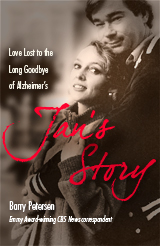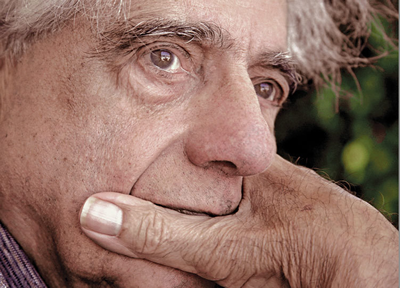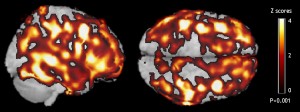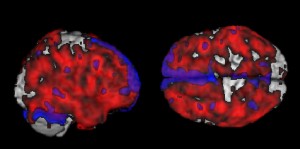 Jan’s Story
Jan’s Story
Love lost to the long goodbye of Alzheimer’s
by Barry Petersen
For most of us the stereotypical concept that we have of aging is that we will live to a ripe old age, fully ‘compos mentis’ finally to succumb to some brief undetermined illness and then die.
Barry Petersen is a seasoned award winning CBS News Correspondent. A reporter in Bosnia, Sarajevo, China and Rwanda, he is no stranger to the horrors of war and genocide. He has witnessed death and destruction many times in the course of his career.
In 2005 his wife Jan was diagnosed with Alzheimer’s disease, she was 55 at the time. Most people think of Alzheimer’s as a disease of the old. But is can strike at anytime and when it does strike early in Barry’s words
“it can rob and cheat and slowly suck the person you love away from you”.
Life’s dreams are cut short and lost. Despite the many traumas Barry was exposed to in his years as a foreign correspondent, he would be ill prepared for how the devastating diagnosis of his wife’s disease would impact his life.
Jan’s Story is a courageous and gut wrenching love story, a chronicle of caring for someone with Alzheimer’s, honestly and intimately recounted. The book is also Barry’s story. He lifts the veil from the social legacy that partners’ of spouse’s who succumb to early onset Alzheimer’s face. Barry opens up a discussion on the difficult and seldom broached topic; that of the caregiver’s needs, of the loneliness and the difficult future decisions and choices that have to be considered when there is no longer a relationship because the one you love has deteriorated so far mentally that they are lost to you. He asks the loaded question “is finding a new person in your life right or wrong?’ He documents his own guilt and grief and how he eventually found light at the end of the tunnel. Hope returns, he discovers recovery is possible for the partner who is left behind, and if it is what they want, someday they can love again.
A unique feature of this book is that it is written by a man. In general men are less vocal about their contributions to caregiving and are often less comfortable addressing the inextricable psychological and emotional aspects of caregiving. Barry recounts his story in the intimate way that confidences are shared with a good friend, leaving no stone in this journey unturned – guilt, stress, depression, anger, irritability, fatigue – with great courage he offers valuable insight and guidance to others who have to follow this path. It’s a tear jerker and its easy to become immersed in the telling of this tragedy, make sure you keep your Kleenex on hand!
Being a family gets complicated when Alzheimer’s enters the picture. Alzheimer’s currently touches one in five household in the U.S. The over 65 population is growing four times faster that the under 65 population and someone is diagnosed with Alzheimer’s every 70 seconds. Caregiving /caring for someone who has Alzheimer’s has simply failed to attract the attention that an issue of this magnitude merits. In Jan’s Story Barry has humanized the story of Alzheimer’s.
This is a book that fulfills a basic need that many caregivers of Alzheimer’s suffers have… it walks you through and says “here’s what you can expect”. If you need a reason to care read this book.
Jan’s Story
Love lost to the long goodbye of Alzheimer’s
by Barry Petersen
Non-fiction
$15.95
ISBN:978-1-933016-44-3
Behler Publications
Would you like the chance to win a copy of Jan’s Story? I will be giving away 1 copy of this book on Canada Day July 1st, 2010. All you have to do for a chance to win is leave a comment or:
Subscribe to: ShrinkRap
Follow us on Twitter
Follow us on Facebook




